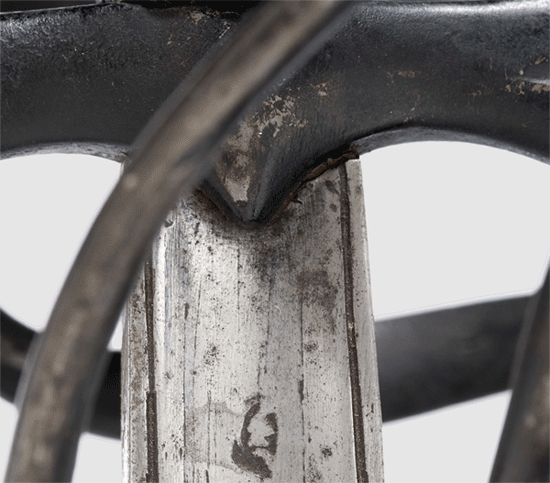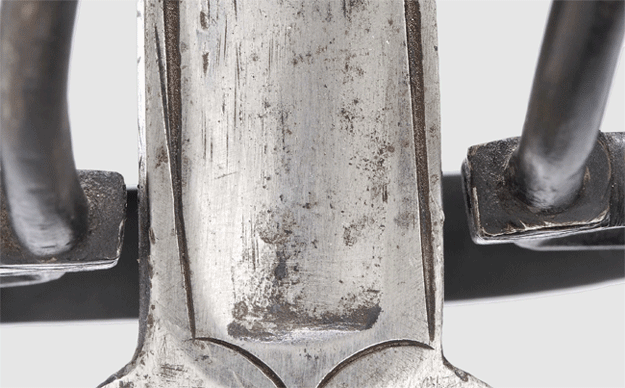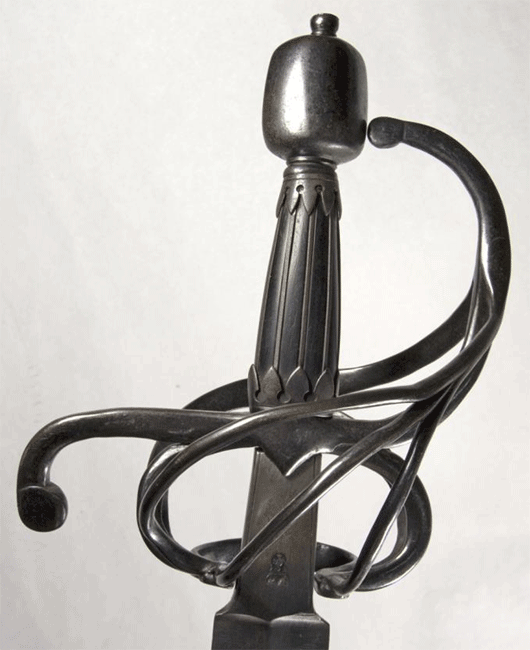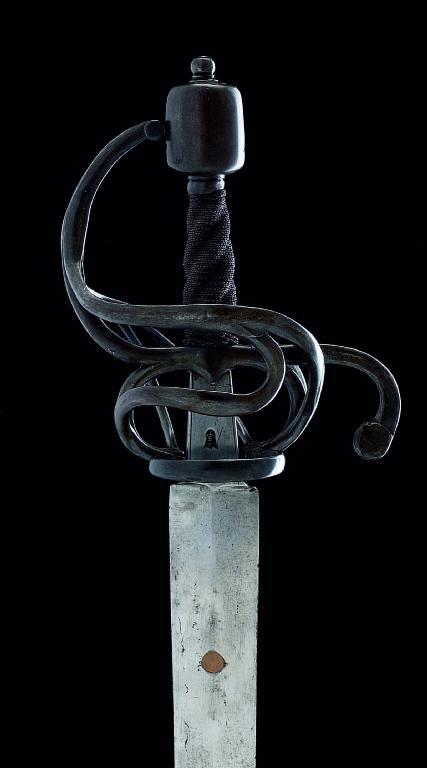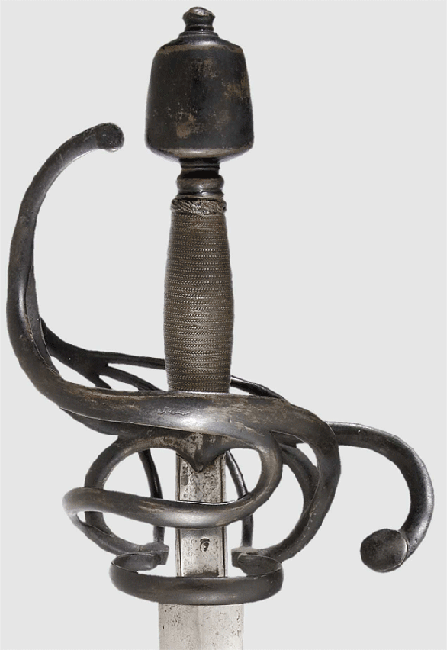Posts: 5,981 Location: Birmingham, Alabama
Wed 10 Sep, 2008 1:11 pm
Wallace Collection A612
Does anybody have a photo, drawing or catalog text for WC A612?
For reference, this is the sword upon which A&A based it's Town Guard sword (first image below).
The next two photos show swords by the same manufacturer, Wolfgang Stantler.
I found some old data online for "rapiers in the
Wallace Collection," and although A612 is included in those tables, I don't know the source or reliability of the data.
Any help is welcome.
 Attachment: 11.16 KB
Attachment: 11.16 KB

 Attachment: 37.21 KB
Attachment: 37.21 KB
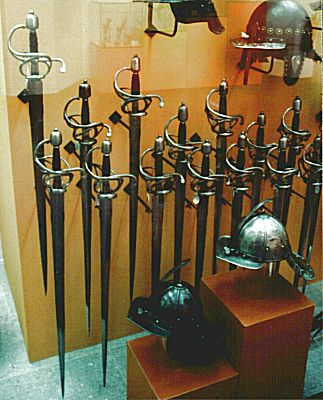
 Attachment: 54.01 KB
Attachment: 54.01 KB
[ Download ]
Posts: 4,194 Location: Northern VA,USA
Wed 10 Sep, 2008 7:52 pm
Unfortunately, I don't have any info for you Sean. But I would also love to know if anyone has any data: This style of sword seems to have be recreated quite a bit. There is one in the National Museum of the American Indian, and there is another on loan from the Higgins which is currently at the Folger Shakespeare Library in DC (though this one has a blued hilt). I've seen others elsewhere, and all of the ones I've seen are attributed to Munich for use by the town guard.
One of the really intriguing things about the design, to me, is that the ricasso is incredibly thick, but the blade tapers very drastically. Eyeballing them from behind the glass, I'd guess the ricasso of these tend to be about 3/8 of an inch thick... that's nearly half an inch! Modern repros just don't do that (probably because it isn't cost effective with
stock removal).
Posts: 570 Location: Gothenburg/Sweden
Wed 10 Sep, 2008 11:42 pm
This type of sword seems to have been highly popoular in the first decades of the 17th Century, however I have some serious doubts about the sword being made for use by the Munich Town Guard. Swedish, Dutch & some German historians consider it a cavalry weapon used mainly by the Cuirassiers. At a glance the design and quality of the sword seems to support this. I have yet to see a 'common' infantry sword from the same period which is as finely made and all I have seen tend to favour the cut more than the thrust. The A612 and it's realtives all favour the thrust and seems to be a type XV/XVa fited with a complex hilt.
The first of two such swords on display in the Swedish Army museum
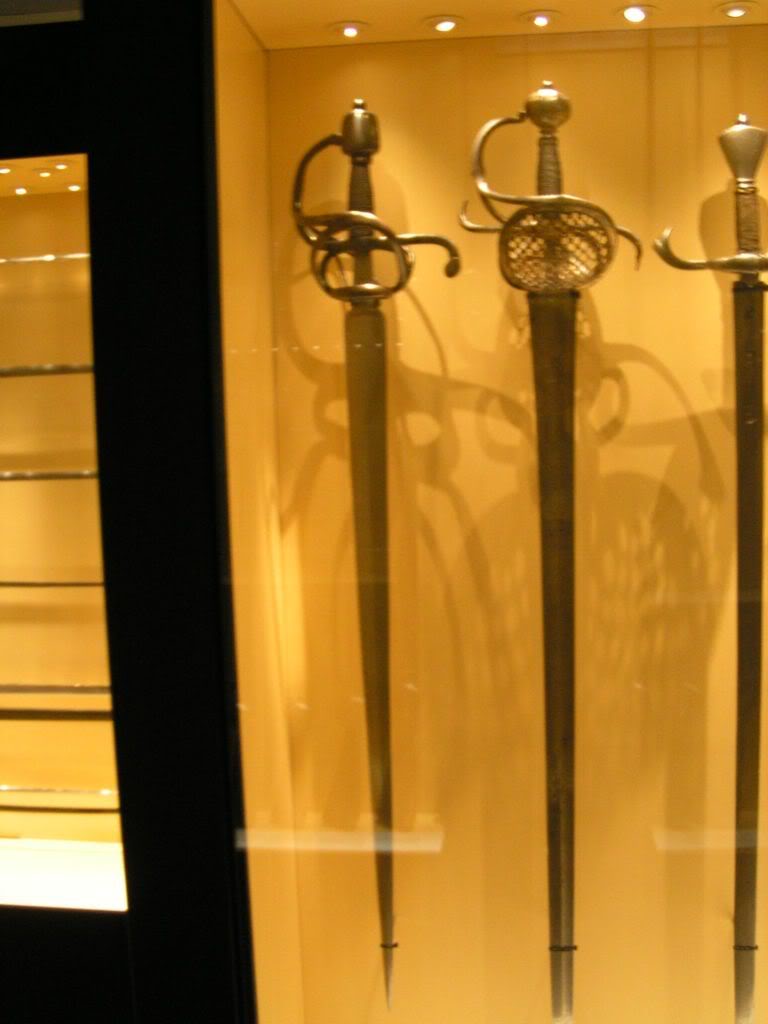
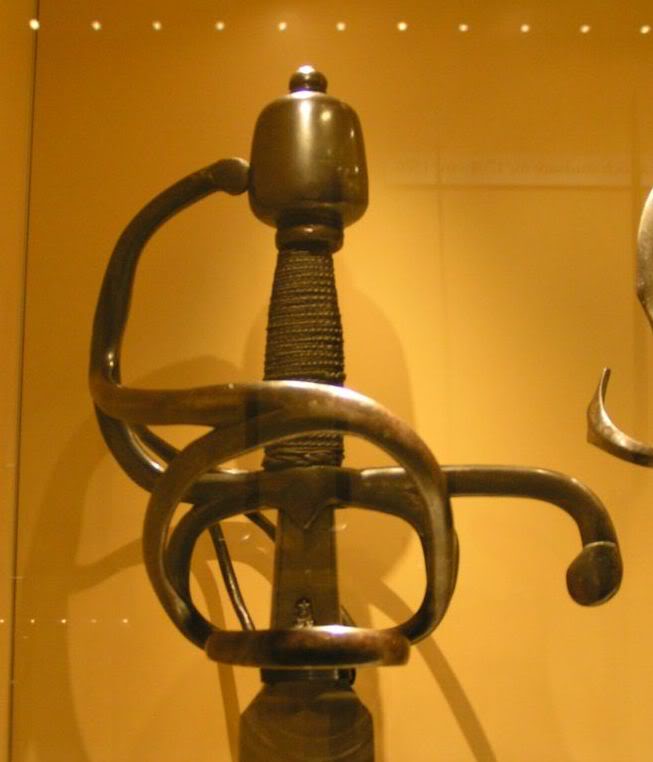
The second of the Army museum swords.
http://www.sfhm.se/templates/pages/ArmeObject...anguage=EN
Franco-Swedish Colonel (later Fieldmarshall) Jacob De la Gardie wearing version with a gilded hilt in the Netherlands 1606
[ Linked Image ]
Posts: 229 Location: Rotherham, West Riding
Thu 11 Sep, 2008 1:22 am
Town Guard
If the Town guards in Europe are anything like the Dutch Militia guilds and the city based Trained bands in England, then they are very definitely NOT common soldiers. The group that makes up such bodies in England and the Netherlands are those with the largest stake in the City orTown, frequently quite well to do or down right weathly men with considerable status and cash.
The expenditure these groups would go through to display their and their home towns wealth would be considerably above the limited expenditure the state would pay for common soldiers.
Posts: 5,981 Location: Birmingham, Alabama
Thu 11 Sep, 2008 6:10 am
Great info, guys! Excellent photo support, Daniel!
Thanks!
Posts: 616 Location: Toronto, Canada
Thu 11 Sep, 2008 12:34 pm
Well, its not the best shot but perhaps it will be of use. I have two or three other views that include that sword. Each is about 2Mb at full res, if you want them.
 Attachment: 126.12 KB
Attachment: 126.12 KB
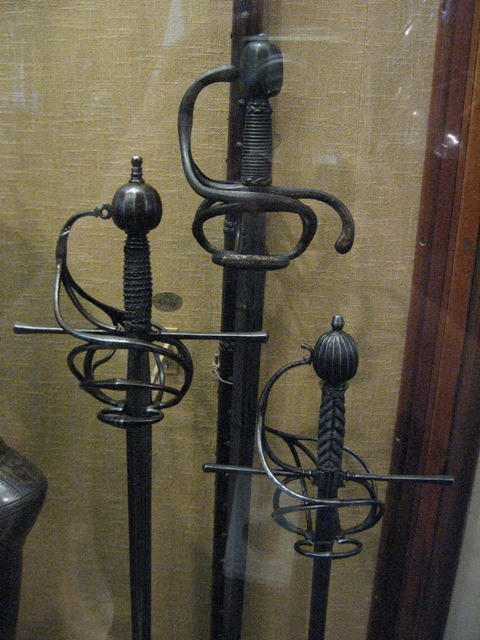
Wallace A612 in the centre
Posts: 365 Location: Ashburn VA
Thu 11 Sep, 2008 12:36 pm
I just packed my books to move or I would get out my
Wallace Collection books.
Posts: 9,580 Location: Dayton, OH
Thu 11 Sep, 2008 1:34 pm
| James Barker wrote: |
| I just packed my books to move or I would get out my Wallace Collection books. |
I couldn't find A612 pictured in the James Mann Wallace Collection catalogues. It's also not pictured in AVB Norman's The Rapier and Small-Sword (at least not that I could find).
Posts: 2 Location: UK
Thu 11 Sep, 2008 1:55 pm
The text from the 1962 catalogue describes it as follows:
| Quote: |
A612 SWORD
Swept hilt, with POMMEL of flattened cylindrical form, with button; wire bound grip; single curving QUILLON, the end with slight horizontal recurve and widening at the end; PAS D' ÂNE, double RING, loop connecting with KNUCKLE-GUARD, and two transverse bars on the inner side, the whole of blued steel; broad, two-edged BLADE of flattened diamond section, the narrow ricasso deeply stamped on either side with the maker's mark, the letters ST [the S above the T] crowned, used by Wolfgang Stantler, the Munich bladesmith.
L. 31 1/4 (79.3); W. 1 13/16 (4.5) Wt. 3:6 (1.535)
German (Munich), about 1600
This sword belongs to one of three classes of early XVIIth-century cavalry swords, of which large numbers are in the Bavarian National Museum, Munich. They were formerly in the Bayr. Armee-museum, when the late Dr. Stöcklein disposed of many surplus specimens by exchange. These are now scattered among many collections. Examples which left Munich, like this one, at an earlier date, are in the Armouries of the Tower of London.
Nos. A532 and 652 bear a crowned ST, but of a different type. |
Another, apparently similar, Wolfgang Stantler sword was listed in the June 2008 Thomas Del Mar auction as lot 112: http://www.thomasdelmar.com/Catalogues/as250608/page4.htm
Glyn.
Posts: 5,981 Location: Birmingham, Alabama
Wed 10 Dec, 2008 10:05 am
Found this by accident--it's the Folger sword Bill mentioned above. The sword is featured in the segment on Romeo & Juliet (mounted upside down, unfortunately):
http://www.youtube.com/watch?v=q2vb-k5XtwM
This gives a good sense of scale. I'd note that this weapon isn't really the sort that Silver railed against. It has a complex hilt but isn't a long, slender civilian rapier ( or "bird-spit" to quote Silver). It's a broad-blade military sword more like what Silver favored. And, of course, this example is German rather than Italian.
Posts: 238 Location: Vancouver Canada
Wed 10 Dec, 2008 5:27 pm
A little off topic but we just put one together.
Sorry I know this is off topic but we just put a practice version of this style of sword together for a friend using parts purchased from Darkwood armory.
The recipe was
Take one slightly modified model 2 ring swept 1 hilt add walnut grip and cylindrical pommel. Top up with model DA4BD broadsword blade. Assemble all the ingredients and out pops a new sword.
The combination produces a very nice sword, if it was sharp I would not want to stand in front of it. He is currently using it in our groups "Lets learn Mr. Silvers approach to the single sword" practice and it may show up for SCA cut and thrust.
Again sorry for the interruption, but I really like this style of sword and I am really happy with the results we got.
Mackenzie
 Attachment: 39.8 KB
Attachment: 39.8 KB
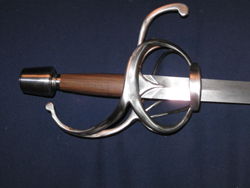
 Attachment: 43.06 KB
Attachment: 43.06 KB
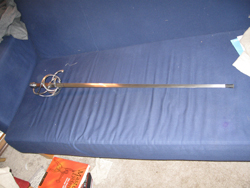
Posts: 5,981 Location: Birmingham, Alabama
Thu 22 Jan, 2009 1:55 pm
Aha! The
Wallace Collection has added A612 to its online database:
 Attachment: 74.33 KB
Attachment: 74.33 KB
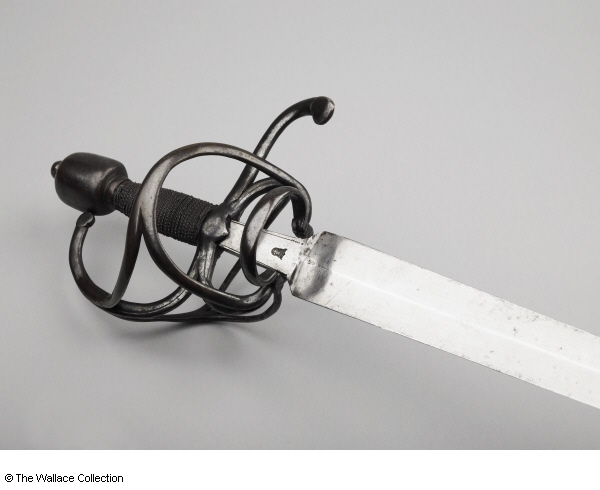
Posts: 115
Fri 23 Jan, 2009 7:44 am
Does anyone here own the A&A version of the sword?
I have been seriously considering ordering this sword and having a matching parrying dagger constructed for it as well.
I have this thing for complex hilted cut & thrust swords.
Posts: 5,981 Location: Birmingham, Alabama
Fri 23 Jan, 2009 8:53 am
| Chris Arrington wrote: |
Does anyone here own the A&A version of the sword?
I have been seriously considering ordering this sword and having a matching parrying dagger constructed for it as well.
I have this thing for complex hilted cut & thrust swords. |
If the stars align just right in coming months, I'll get my hands on one of these beauties! I share your interest, and A&A seems to have the market cornered. :D
Posts: 115
Fri 23 Jan, 2009 9:03 am
Sean,
Please, keep me up to date. Any idea what the turn around time at A&A is for one of these beauties?
Posts: 5,981 Location: Birmingham, Alabama
Fri 23 Jan, 2009 9:08 am
| Chris Arrington wrote: |
Sean,
Please, keep me up to date. Any idea what the turn around time at A&A is for one of these beauties? |
I don't, but Craig would probably be happy to give you an estimate.
Posts: 5,981 Location: Birmingham, Alabama
Wed 28 Jan, 2009 11:25 am
Posts: 109 Location: Annapolis, MD
Wed 28 Jan, 2009 12:49 pm
Looks like Windlass has its own version of this one coming.
http://www.museumreplicas.com/p-729-munich-sword.aspx
It looks interesting, but I have a sinking suspicion MRL is spending a bit of time with the A&A catalogue.
Also, Sean, do you know whether the hilt is darkened due to natural corrosion of the steel or if it was blued?
Posts: 5,981 Location: Birmingham, Alabama
Wed 28 Jan, 2009 1:19 pm
I'm happy to see this kind of sword get the limelight, but...first the "Erbach" and now the "Munich". Can the "Albrecht Dürer Sword" be far behind? Windlass may have gotten their information the same way A&A did, but it does seem strange that Windlass would choose to mirror two staples of the A&A catalog.
Note that the Windlass version has an almost straight-tapering grip more like that of the Town Guard than the original examples posted above (with more pronounced barrel-shaped grips.) That isn't necessarily evidence of copying, though. Maybe just a common time-saving measure. The grip is easily replaced, of course. The bigger problem is with the rings--they're too small. Compare them to the originals or the Town Guard. That would have significant implications for handling.
Though the A&A and Windlass swords are superficially similar, I would bet that the Windlass blade is thinner (usually is). That would make a big difference in a sword intended to be a robust cut-and-thrust military sword. Balance might be very different, given the amount of material in the hilts. But, it would probably be a good project sword after the price comes down to the $200 range. New grip, new finish, bluing, sharpening, etc. I'd love to get one of those in my hands for review....
On the finish of the Hermann Historica and Wallace examples--many (most? all?) of these field swords by Stantler were originally blued, so what you're seeing is the original dark hilt finish.
Posts: 5,981 Location: Birmingham, Alabama
Wed 28 Jan, 2009 1:49 pm
Last edited by Sean Flynt on Thu 29 Jan, 2009 7:09 am; edited 1 time in total
You
cannot post new topics in this forum
You
cannot reply to topics in this forum
You
cannot edit your posts in this forum
You
cannot delete your posts in this forum
You
cannot vote in polls in this forum
You
cannot attach files in this forum
You
can download files in this forum








